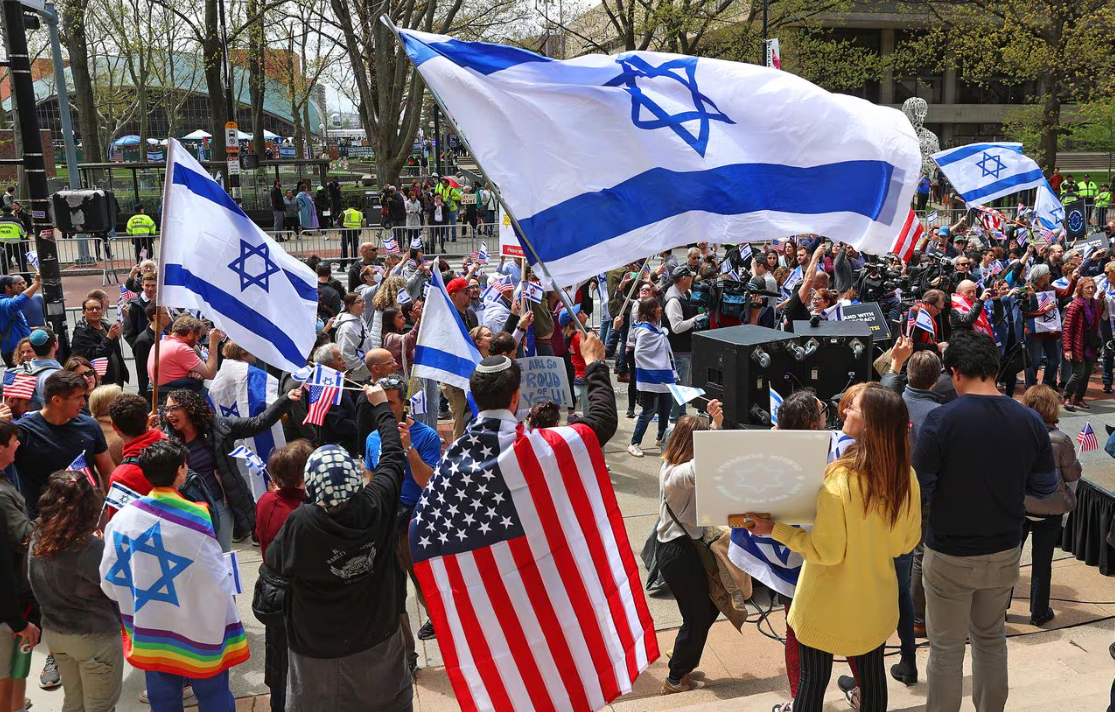在麻省理工学院,抗议活动激烈,但没有逮捕,也没有暴力

【中美创新时报2024 年 5 月 4 日编译讯】(记者温友平编译)周五(3日),穿过麻省理工学院校园中部的马萨诸塞大道是加沙持续冲突双方抗议活动的分界线。人群之间的距离只有一个足球场那么远,但他们的政治观点却截然不同。街道两边的抗议者都在大声疾呼,并坚信对方充其量是消息不灵通,最坏的情况是不道德,整个下午的阳光都照在集会观众身上。对此,《波士顿环球报》记者Danny McDonald 和 Alexa Coultoff作了下述详尽报道。
两个团体之间有短暂的紧张和言语争执,但整个下午平静地度过,没有逮捕或暴力,这与最近几周美国其他地方的许多校园示威活动不同。
在马萨诸塞州大街 77 号的台阶上,亲以色列示威者在以色列和美国国旗的海洋中举行集会,反对他们认为大学校园里正在蔓延的反犹太主义。他们说,该大学对上个月在马萨诸塞大街对面克雷斯吉草坪上建立的亲巴勒斯坦营地的处理存在双重标准。他们还大声呼吁释放哈马斯扣押的人质。
“这是一个让犹太人感到自豪的时刻,”以色列驻新英格兰总领事梅伦·鲁本 (Meron Reuben) 对数百名群众表示,群众欢呼雀跃。
周五,警察封锁了这条繁忙的大道几个小时,数十人在亲巴勒斯坦营地周围转来转去。那里的一些示威者表示,他们认为以色列是一个种族隔离国家,并呼吁麻省理工学院切断与以色列军方的研究联系。

志愿者分发传单,鼓励路人加入“科学家反对种族灭绝营地”,并呼吁结束学术界在他们所谓的以色列“加沙种族灭绝运动”中的共谋。
散发传单的人中有麻省理工学院的研究生约基·米利亚德(Yoki Miliard)。鉴于加沙的死亡和破坏,她说:“我们不希望我们的劳动和工作与此挂钩。”
周五早上,克雷斯吉草坪上的亲巴勒斯坦营地周围竖起了栅栏,很快就出现了杂乱的标牌,反映了校园内因以色列与哈马斯战争而存在的分歧。“自由巴勒斯坦”标语牌旁边有以色列国旗。 围绕营地的栅栏旁立着一块标牌,称赞一名以色列国防军士兵是英雄。
海报板上被绑在栅栏上,潦草地写着亲巴勒斯坦的信息:“基督徒反对以色列种族隔离”和“犹太复国主义:畏缩的最高阶段”。距离酒店仅几步之遥,草地上排列着标语牌,上面画着哈马斯扣押的人质的面孔。以色列国旗被钉在树上。
现场有大量警察在场。麻省理工学院警方多次将电视摄像师赶到人行道上,称他们需要从那里进行录制,因为校园是私人财产。
尽管气氛有时很紧张,但这一场景与周五晚些时候在塔夫茨大学以北几英里处发生的情况形成鲜明对比,那里的亲巴勒斯坦抗议者也搭建了一个类似的营地,向学校施压,要求他们了解加沙局势。周五晚些时候,学生们拆除了抗议场地,称与大学的谈判“失败”。他们指责塔夫茨大学向他们提供了“恶意交易”。
与其他抗议活动一样,学生们希望塔夫茨大学切断与以色列的任何联系。学校告诉抗议者,露营“必须结束”,并表示已向在学术区露营的人发出禁止侵入通知。
塔夫茨大学发言人帕特里克·柯林斯证实,拆除帐篷“并不是与大学达成协议的结果”。
柯林斯在一份声明中说:“我们很高兴营地已被拆除,学术广场上的抗议活动已得到和平、自愿的解决。”
最近几周,为了应对加沙持续的战争,支持巴勒斯坦的抗议活动震动了全国各地的校园。据当地卫生部称,自哈马斯 10 月 7 日发动袭击以来,以色列军队已造成超过 34,000 人死亡,这场袭击造成约 1,200 人死亡,其中大部分是平民,并劫持了大约 250 名人质。
在其他地方,警方使用防暴装备、战术车辆和闪光装置来清理帐篷营地和被占领的建筑物。但周五,这些都没有在剑桥使用。
本周早些时候,纽约哥伦比亚大学警方的镇压行动中有 100 多人被捕。周四早些时候,警察对加州大学洛杉矶分校的一群示威者进行了镇压,最终拘留了至少 200 名抗议者,此前数百人不顾命令离开。
在波士顿,艾默生学院和东北大学的学生营地最近几天被破坏,警方在每个地点逮捕了约 100 人。
在以色列美国委员会新英格兰分会在麻省理工学院举办的集会上,多位发言者否认“犹太复国主义”是一个肮脏的词。人们高喊着释放哈马斯扣押的人质,在唱美国国歌后,人们高呼“美国!”
麻省理工学院博士后研究员德维尔·哈里斯 (Dvir Harris) 表示,学校管理部门未能阻止“反犹太主义和反以色列情绪的爆发以及我们最令人厌恶的社区成员的行为”。他表示,大学官员之所以允许营地存在,是因为他们缺乏道德支柱,他还将亲巴勒斯坦示威者称为“仇恨喷涌者”和“亲哈马斯”。
在街对面,抗议者穿过多个路障,举着巴勒斯坦旗帜和标语,上面写着“让加沙生存!”有一次,一群人举着巨大的横幅,上面写着:“犹太人说:立即停火。”
麻省理工学院研究生、营地参与者哈娜·弗洛雷斯 (Hana Flores) 表示,她和其他人对他们的亲巴勒斯坦空间是反犹太主义的说法感到不安。
“营地的主要目标是要求麻省理工学院切断与以色列军方的研究联系,”她说。“我们并不呼吁切断与以色列机构或个人的联系。”
弗洛雷斯说,麻省理工学院营地有大量犹太人,这与反抗议者声称他们是反犹太人的说法相矛盾。
“对以色列政府的批评并不等同于反犹太主义;这是我们都承认并且非常清楚的事情,”非犹太人弗洛雷斯说。“许多最强大的组织者都是犹太人。”
在“科学家反对种族灭绝”营地成立前,60多名麻省理工学院教职人员组成了一个小组,支持学生向学校提出的要求,帮助维持和平关系。
麻省理工学院忧思教师联盟成员、哲学教授莎莉·哈斯兰格表示:“我们支持学生设立营地以抗议正在进行的种族灭绝的权利。” “营地里异常平静。”
在一份关于正在进行的营地的声明中,麻省理工学院的一位发言人表示,“解决问题的努力仍在继续”,但也强调了校长莎莉·科恩布鲁斯上周的评论,她在评论中表示,“这种特殊的表达形式需要尽快结束。”
沿着大道继续前行,哈佛园内的营地气氛依然高涨,组织者希望向学校政府施压,以满足他们的要求:披露并撤资在以色列的任何投资,并撤销对与抗议活动有关的学生的任何指控。
学习历史的大三学生普林斯·威廉姆斯 (Prince Williams) 表示,哈佛大学的抗议者并不担心警方的行动,尤其是在 5 月 11 日期末考试结束之前。
威廉姆斯说:“我们的计划是无限期地留在这里,推动这个问题,让他们坐到谈判桌上,并满足我们的要求。” 周五,学生们扩大了院子里的营地范围,并给政府规定了 5 月 6 日的谈判期限。
《波士顿环球报》记者 Maddie Khaw、Suchita Nayar、Ava Berger 和 Daniel Kool,以及《波士顿环球报》工作人员的 Hilary Burns 和 Nick Stoico 对本报告做出了贡献。还使用了美联社的材料。
题图:周五,在麻省理工学院马萨诸塞大街亲巴勒斯坦营地对面举行了亲以色列示威活动。DAVID L. RYAN/GLOBE STAFF
附原英文报道:
At MIT, dueling protests, but no arrests and no violence
By Danny McDonald and Alexa Coultoff Globe Staff and Globe Correspondent,Updated May 3, 2024
CAMBRIDGE — The stretch of Massachusetts Avenue that cuts through the middle of the Massachusetts Institute of Technology campus was a dividing line Friday between dueling protests on opposing sides of the ongoing conflict in Gaza.
Little more than the length of a football field separated the crowds, but their politics were worlds apart. Protesters on both sides of the street were full throated in their advocacy and steadfast in their belief that the other side was at best ill informed and at worst immoral, as the sun shone on the rallygoers through the afternoon.
There were fleeting moments of tension and verbal sparring between the two groups, but the afternoon passed peacefully, with no arrests or violence, unlike many campus demonstrations elsewhere in the United States in recent weeks.
On the steps of 77 Massachusetts Ave., pro-Israel demonstrators, amid a sea of Israeli and American flags, rallied against what they saw as an encroaching antisemitism on college campuses. They said there is a double standard in the university’s treatment of a pro-Palestinian encampment that was erected last month just across Mass. Ave. from them on the Kresge Lawn. And they issued a clarion call for the release of hostages held by Hamas.
“This is a time to be Jewish and proud,” Meron Reuben, consul general of Israel to New England, told the crowd of several hundred, who cheered in response.
Across the busy thoroughfare, which police closed to traffic for several hours Friday, scores milled about the pro-Palestinian encampment. Some demonstrators there said they considered Israel to be an apartheid state and called for MIT to cut research ties with the Israeli military.
Volunteers handed out leaflets that encouraged passersby to join the “Scientists Against Genocide Encampment” and to call for the end of academic complicity in what they termed Israel’s “genocidal campaign in Gaza.”
Among those handing out those leaflets was MIT graduate student Yoki Miliard. Given the death and destruction in Gaza, she said, “We don’t want our labor and work to be tied to that.”
Friday morning, fencing was erected around the pro-Palestinian encampment on Kresge Lawn that soon bore a mishmash of signage that reflected the chasm on campus over the Israel-Hamas war. There were Israeli flags next to “Free Palestine” placards. One sign standing next to the fence that encircled the encampment hailed an Israel Defense Forces soldier as a hero.
Lashed to the fence, there were pro-Palestinian messages scrawled on poster board: “Christians against Israeli apartheid,” and “Zionism: the highest stage of cringe.” Mere steps away, there were placards arrayed in a grassy area showing the faces of hostages held by Hamas. Israeli flags were tacked to trees.
There was a heavy police presence. Multiple times, MIT police shooed television camera operators to the sidewalk, saying they needed to record from there, as the campus was private property.
Tense as it was at times, the scene was in sharp contrast to what unfolded later Friday a few miles north on the campus of Tufts University, where pro-Palestinian protesters had pitched a similar encampment to press their school on the situation in Gaza. Late Friday, the students dismantled their protest site saying negotiations with the university had “failed.” They accused Tufts of offering them a “bad-faith deal.”
As with other protests, the students wanted Tufts to sever any connections to Israel. The school had told the protesters the encampment “must end” and said it had issued no-trespass notices to those camping on its academic quad.
Tufts spokesperson Patrick Collins confirmed the removal of the tents “was not the result of an agreement with the university.”
“We’re pleased that the encampment has been taken down and that the protest on the academic quad has been resolved peacefully and voluntarily,” Collins said in a statement.
Pro-Palestinian protests have rocked campuses throughout the country in recent weeks in response to the ongoing war in Gaza. Israeli forces have killed more than 34,000 people, according to the local health ministry, since the war began with an attack by Hamas on Oct. 7 that killed about 1,200 people, mostly civilians, and took roughly 250 hostages.
Elsewhere, police have used riot gear, tactical vehicles, and flash-bang devices to clear tent encampments and occupied buildings. But none of that was in use in Cambridge Friday.
Earlier in the week, more than 100 were arrested during a police crackdown at Columbia University in New York. Early Thursday, officers surged against a crowd of demonstrators at the University of California, Los Angeles, ultimately taking at least 200 protesters into custody after hundreds defied orders to leave.
In Boston, student encampments were broken up at Emerson College and Northeastern University in recent days, with police arresting around 100 people at each location.
During the rally at MIT organized by the New England chapter of the Israeli American Council, multiple speakers rejected the notion that “Zionism” is a dirty word. There were chants to free the hostages held by Hamas, and after the US national anthem was sung, a chant of “USA!” broke out.
Dvir Harris, a postdoctoral fellow at MIT, said the school administration has failed to prevent an “explosion of antisemitic and anti-Israeli sentiments and acts by our most disgusting community members.” He suggested university officials have allowed the encampment to exist because they lack a moral backbone, and he labeled the pro-Palestinian demonstrators as “hate-spewing” and “pro-Hamas.”
Across the street, through multiple barricades, protesters held Palestinian flags and signs reading, “Let Gaza Live!” At one point, a group held a huge banner that read, “Jews say: Ceasefire Now.”
Hana Flores, an MIT graduate student and participant at the encampment, said she and others were upset by claims their pro-Palestinian space was antisemitic.
”The primary goal of the encampment is to demand that MIT cut its research ties with the Israeli military,” she said. “We are not calling for the cutting of ties with Israeli institutions or individuals.”
Flores said there is a large Jewish presence at the MIT encampment, which contradicts counterprotesters’ claims they are anti-Jewish.
”Criticism of the Israeli government is not synonymous with antisemitism; this is something that we all recognize and is very clear,” said Flores, who is not Jewish. ”A lot of the strongest organizers are Jewish people.”
More than 60 MIT faculty members formed a group before the “Scientists Against Genocide” encampment was set up to support students in their demands from the university and help maintain peaceful relations.
”We support the students’ right to have an encampment to protest the ongoing genocide,” said Sally Haslanger, a member of the MIT Alliance of Concerned Faculty and a philosophy professor. “The camp has been incredibly peaceful.”
In a statement about the ongoing encampment, an MIT spokesperson said, “Efforts to resolve the situation continue,” but also underscored president Sally Kornbluth’s comments last week in which she said, “This particular form of expression needs to end soon.”
Farther down the avenue, spirits remained high at the encampment inside Harvard Yard, where organizers hope to pressure the administration to meet their demands: disclosing and divesting from any investments in Israel and dropping any charges against students related to protests.
Prince Williams, a junior studying history, said Harvard protesters aren’t worried about police action, especially not before finals end May 11.
”Our plan is to stay here indefinitely, push the issue, get them at the negotiating table, and to address our demands,” Williams said. The students expanded the footprint of their encampment inside the yard on Friday and also gave the administration a May 6 deadline to negotiate.
Globe correspondents Maddie Khaw, Suchita Nayar, Ava Berger, and Daniel Kool, and Hilary Burns and Nick Stoico of the Globe staff contributed to this report. Material from the Associated Press also was used.

